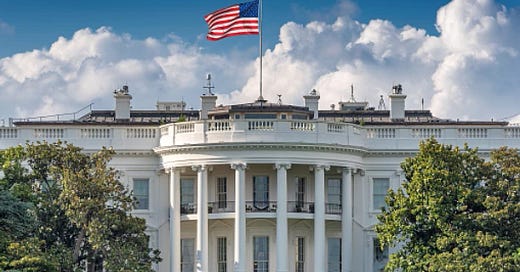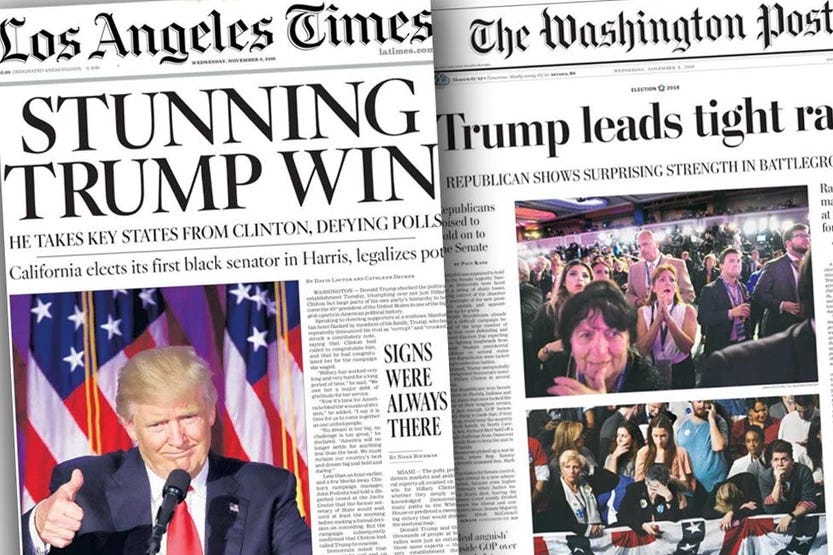What happens when the world's greatest democracy starts to backslide?
Reversing this dangerous trend won’t be easy, particularly when our political parties have intrinsically different views on preventing election fraud and corruption.
“The monumental human victory achieved when democracy became the predominant form of governance now hangs in the balance like never before.”
Throughout world history, there’s only been one nation with a successful democracy lasting longer than 200 years. Guess which one?
The White House. Courtesy: Getty Images
The United States’ foundation on democratic ideals is what sets it apart from the rest of the world: the idea that every voting citizen has a say in the direction of our nation. And if we’re not happy with the outcome of an election? There’s always next time.
But when Americans start to wonder if each vote actually matters, our foundation is rocked, and our democracy is suddenly put at risk. If we can’t rely on the legitimacy of our elections, we’re cracking open a formidable Pandora’s box.
That’s arguably what’s happening right now. It’s one of the reasons European think tank International IDEA categorized the US as a “backsliding democracy” in its Global State of Democracy report – for the first time in history. Other reasons for the new categorization include authoritarian tendencies in our government policies, as well as ineffective lawmaking and suppressed freedom of expression and assembly.
Courtesy: The Global State of Democracy 2021 report
The global pandemic didn’t help. According to the report, the pandemic emboldened government leaders to “deploy wide-ranging emergency powers,” along with “tools and justification for repressive tactics and silencing of dissent.”
The result? Democracy “now hangs in the balance like never before.”
How did the U.S. begin to backslide?
The answer begins with polarization, which according to this report, is strongly correlated with weakening democracies. And in the U.S., polarization has been on the rise for the past decade.
The widening gap along the political spectrum is due to a host of factors including more extreme political candidates winning their races, coupled with the revolutionary shifts in news consumption, social media algorithms, and the power of a single, inflammatory soundbite.
As mistrust grew between left and right, the consequences of expressing one’s political opinions often became no longer worth the risk.
Political polarization continues to deepen in the U.S.
It was this environment that led to the mainstream media’s utter dismay when Donald Trump beat Hilary Clinton in the 2016 presidential election. Why the surprise? Roughly half of America didn’t talk about voting for Trump; they just did it.
Mainstream media headlines after Trump's victory. Courtesy: BBC.
And then a turning point: blinded by their hatred for the Donald and disbelief that Americans would actually send him to the White House, Democratic lawmakers came to the conclusion that Trump must have cheated his way there – and claimed “the Russian government interfered in the 2016 election in sweeping and systemic fashion.” After years of investigation, the final reports did conclude that Russia did, in fact, attempt to interfere in the election by hacking Democratic Party emails – but ultimately could not demonstrate a criminal conspiracy between Trump’s advisors and the Russians to sway the election.
President Trump and Russian President Vladimir Putin shake hands during a meeting at the G20 Summit in Hamburg, Germany, on July 7, 2017. Courtesy: Getty Images.
Nevertheless, the seed of skepticism had been planted. After that, the accusation of a rigged presidential election was no longer so farfetched.
After his loss in 2020, Trump announced that the election was stolen from him - and millions of his supporters agreed. So the Justice Department got involved. Ballots were examined, recounted, then recounted again. Although Republicans did regain some ground, it wasn’t enough to change the result.
And then January 6th, 2021 happened. Extremist Trump supporters stormed the Capitol to “take it back” from the incoming Democratic administration. Terrified lawmakers took cover, and 753 people were criminally charged in the riot – the largest prosecution in Justice Department history.
If you were to describe a country whose most recently elections have been rife with allegations of foreign interference and voter fraud – not to mention mounting anger culminating in political violence – it’s hard to fathom you’re talking about the United States.
Why it matters
We need to get our act together – and not just for our own sake. The U.S. is a bastion of global democracy, and when we veer away from democratic ideals, other nations follow suit. The IDEA report states that our 2020 election scandal had “spillover effects” on democracies in Brazil, Mexico, Myanmar and Peru.
What we can do about it
As we continue to experience firsthand, the loss of trust in our electoral process leads to deeper divisions, instability and violence, not to mention costly investigations that only take time and resources from other, arguably more valuable pursuits. We need to work together to turn this ship around – before it’s too late.
Just this week, Trump continued to repeat his claims of the stolen election during a rally with his supporters. Thankfully, some bold Republicans are starting to stand up in opposition to this dangerous narrative. Because in and of itself, the act of accusing isn’t wrong; it’s continuing to push and accuse – now that the exhaustive investigation is complete.
Both sides are guilty. Also this week, Democrats tried to eliminate the filibuster in order to pass a sweeping voting rights bill – and failed at both.
Sen. Joe Manchin speaks during the debate about voting rights legislation on the floor of the U.S. Senate in Washington, D.C., Jan. 19, 2022. Courtesy: Senate TV.
Reversing our backsliding democracy won’t be easy, particularly when both parties have intrinsically different views on how to prevent election fraud and corruption. But it’s not hopeless, as long as we’re able to remember a) that we’re alike in more ways than the country listed on our passports, and b) why the right to vote is so essential.
So let’s exercise our right and elect politicians willing to step out on a limb instead of always towing the party line; in other words, true leaders committed to bringing American politics closer to the center – which will ultimately benefit all of us – rather than focusing on their own survival.
Let’s learn from the past, not take our freedom for granted and reverse this trend now – before saving democracy necessitates fighting another world war, as our grandparents did.









